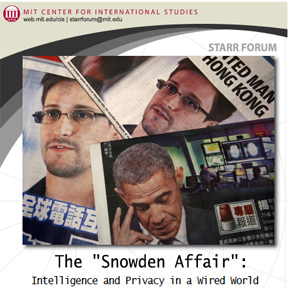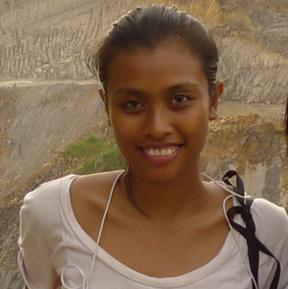How Should We Use Our Intelligence?
by Peter Dizikes, MIT News Office | Originally published here

The Center hosted a Starr Forum on the "Snowden Affair" on December 12. Guest speakers included Susan Chira, Assistant Managing Editor, New York Times; Chas Freeman, retired career diplomat, ambassador, and assistant secretary of defense; and Joel Brenner, former senior counsel at National Security Agency. Admiral William Fallon, former head of CENTCOM, moderated the discussion.
HOW DO WE balance national security and privacy in an age when the government can access virtually all of our electronic communications?
That question hit the public sphere with new force in June, when former U.S. intelligence contractor Edward Snowden disclosed, largely via the British newspaper The Guardian, new material about the extent of the surveillance operations undertaken by the National Security Agency (NSA).
Six months later, a public forum held at MIT on Thursday showed that fault lines exist even among highly placed former government officials. Joel Brenner, a former general counsel for the NSA, largely defended an agency whose workers are, he said, "tasked with finding terrorists they don't yet know about," and thus in need of copious data.
On the other hand, former U.S. ambassador to Saudi Arabia Chas Freeman sounded a sharply critical note, decrying the "cancerous growth of the government surveillance apparatus," which he described as "only tangentially related to national security."
What the principals agreed on, generally, was the need for a more vigorous public discussion of the topic. Brenner asserted that the agency's efforts have been legal and suggested that the disclosure of its programs years ago would have pre–empted the current controversy.
"We are in the midst of a very unusual, I think unique, intelligence affair," Brenner said, noting that most previous intelligence scandals have involved failures to warn government officials of incipient military strikes, or abuses of well–known legal standards. Instead, Brenner asserted, "It's the first time we have an intelligence scandal involving an agency that's done what it was legally authorized to do.",
The legality of the NSA's activities, and the secretive process used to establish those legal foundations, has been a major source of controversy. However, Brenner recounted, soon after he joined the NSA in 2002, he learned about the surveillance programs, and suggested to other officials that Congress should add them to its Foreign Intelligence Surveillance Act (FISA), passed in 1978, which bans domestic spying in the U.S. without probable cause that the surveillance target represents a foreign power.
"The unity in the country behind the fundamental authorities of the intelligence business is a strategic goal," Brenner said. "I mean, intelligence involves secret, powerful institutions in a political culture that is deeply hostile both to power and secrecy. The only way you square that circle is when the public understands what the broad rules are, and has reason to believe they're being followed."
Freeman, by contrast, criticized the tight limits the executive branch of government has placed on discussion of its data-gathering activities, even among the members of Congress who are supposed to be overseeing it.
Snowden's disclosures, Freeman said, were intended to make the point that "we Americans now live under a government that precludes legal or political challenges to its own increasingly deviant behavior."
Out of the 'goldfish bowl'
The panel discussion, titled, "The 'Snowden Affair:' Intelligence and Privacy in a Wired World," was hosted by MIT's Center for International Studies (CIS) and held in MIT's Media Lab before a capacity audience of about 200 people. It was part of CIS's regular Starr Forum series of panels on pressing topics in the international arena.
The panel was moderated by Adm. William Fallon, a CIS scholar and the former head of CENTCOM, the U.S. military command overseeing the Middle East, Central Asia, and parts of East Africa. Fallon also served previously as head of the U.S. Pacific Command.
"We are in a decidedly different world, in the business of intelligence and national security, than we were just a few years ago when I was on active duty, in that the leapfrogging advances in technology enable so many more things to occur," said Fallon, who was head of the U.S. Pacific Command from 2005 to 2007, and head of CENTCOM in 2007 and 2008.
Freeman, for his part, said his views had been profoundly shaped by his experiences as a diplomat and defense department official, a period during which his overseas travel was closely monitored by foreign countries.
"For 30 years I was a consumer of intelligence, as well as a producer of it," Freeman said. "I was also a victim of it. Every bedroom I ever stayed in [as a diplomat] had cameras in the walls and microphones as well." Having experienced that, he added, "I have a strong view that ordinary Americans, or people not associated with government officialdom, should not have to live their lives in the goldfish bowl that I did."
Panelist Susan Chira, an assistant managing editor at The New York Times who specializes in international coverage, added that the media had a significant responsibility to push for disclosures concerning such government activities.
"Transparency leads to accountability," said Chira, who questioned the independence of the court tasked with approving the NSA's requests for domestic surveillance.
In response, Brenner said, "It is not a rubber stamp," adding, "The court is very tough."
As former government officials, Brenner, Fallon, and Freeman all expressed uneasiness with Snowden's actions, saying that such disclosures made the work of intelligence agents, diplomats, and the military harder, although Freeman was willing to defend Snowden to a significant extent.
"As someone long in service to our country, I am upset by such defiance of authority," Freeman said. "But as an American, I am not."
Reprinted with permission of MIT News.
NSF Grant to Develop Synthetic Biology Research Agenda
Project Aims to Address Ecological Effects before Problems Materialize
THE CENTER AND THE Woodrow Wilson International Center for Scholars are collaborating on a $233 ,000 grant from the National Science Foundation (NSF) to help realize potential benefits and to address potential ecological effects of synthetic biology.
The grant is supported jointly by three units within NSF, the Division of Cellular and Molecular Biology, the Division of Environmental Biology, and the Engineering Directorate. The grant will fund development of an interdisciplinar y research agenda to improve understanding of potential ecological effects of commercial uses of synthetic biology. The research agenda will be developed through consultations among synthetic biologists, evolutionary biologists, ecologists , and environmental scientists. It will be based on workshops that focus on near—and medium—term applications of synthetic biology, with scenarios based on the intentional and unintentional release of engineered organisms.
This project will be conducted jointly by the Program on Emerging Technologies of the MIT Center for International Studies (led by Professor Kenneth Oye) and the Synthetic Biology Project at the Wilson Center. It will build on four previous workshops that brought together a wide range of scientists, regulators, NGOs, companies , and other stakeholders to discuss possible ecological risks associated with synthetic biology products and to identify sources of uncertainty over risks. These workshops were funded jointly by the Alfred P. Sloan Foundation and the NSF Synthetic Biology Engineering Research Center. The project is expected to be completed in one ye ar. A small board of advisors has been created to guide the design and execution of the workshops.
Indonesian Journalist Prodita Sabarini Joins CIS

Prodita Sabarini, 2013-14 Elizabeth Neuffer Fellow
PRODITA SABARINI, a Jakarta-based journalist, has been selected as the 2013–14 Elizabeth Neuffer Fellow. The award is offered through the International Women's Media Foundation (IWMF) and is sponsored in part by CIS. Beginning in September, Sabarini will spend the seven-month fellowship as a research associate at CIS. She will also complete internships at The Boston Globe and The New York Times.
Sabarini is the ninth recipient of the annual fellowship, which gives a woman journalist working in print, broadcast or online media the opportunity to build skills while focusing exclusively on human rights journalism and social justice issues.
Sabarini, a staff reporter for the English daily The Jakarta Post, was chosen from a pool of highly qualified applicants from around the world. She plans to research the phenomenon of religious intolerance in Indonesia during her tenure as the Elizabeth Neuffer Fellow and wishes to explore the factors that turn people's fear into acts of violence.
"The Elizabeth Neuffer Fellowship provides an opportunity to access research materials that are not available in my home country," Sabarini said. Peter Canellos, Editorial Page editor at The Boston Globe and a member of the Neuffer Fellow selection committee, noted that "the Neuffer fellows are both students and teachers. Each fellow has made her impact felt in Boston and elsewhere in the United States, and then taken her own lessons back to readers in Uganda, Colombia, Pakistan, India, and many other countries where former fellows are living and working."
"It is an honor to have Prodita among us. My hope is that she finds her time in an academic setting richly rewarding," said Richard Samuels, director of the Center for International Studies and Ford International Professor of Political Science at MIT.
The fellowship is named for Elizabeth Neuffer, a Boston Globe reporter and the winner of a 1998 IWMF Courage in Journalism Award who was killed while on assignment in Iraq in 2003. Neuffer's life mission was to promote international understanding of human rights and social justice.



